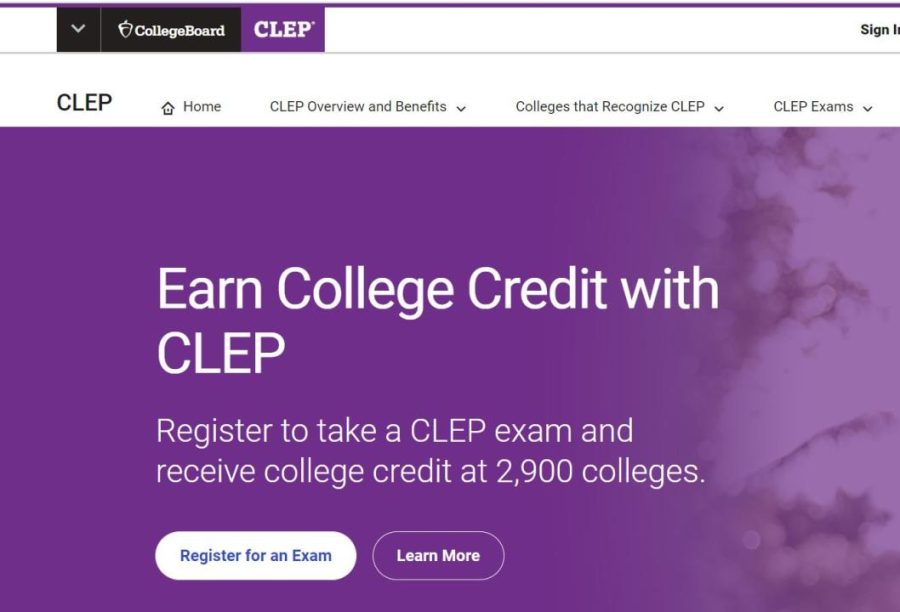What are CLEP exams?
College Board has another way for students to get college credit. One that’s all multiple choice, shorter and able to be free. Photo by Isabella Bonilla
April 13, 2022
Almost all high school students have heard of AP exams, the ACT, the SAT and other similar tests. It’s no secret that we rely on College Board, but what if we told you that there’s another, easier way to get college credit that has the potential to be cheaper, even completely free? Welcome to the world of CLEP.
College-Level Examination Program (CLEP) exams are primarily used by individuals who are returning to school after not being enrolled for a period of time or are in the military; however, they are open to high school students as well. They do not have an accompanying class and are not widely advertised, which may be why they are not viewed to be as “prestigious” as their sister AP exams. They do cover primarily the same topics (if not more) than APs do, with a few minor content differences. So what makes them so special? Why should you care about CLEPs at all?
CLEP exams are entirely composed of multiple choice questions (that’s right, no writing unless you take Composition or Spanish with writing!). They take about 90 to 120 minutes to complete. They may also be taken year round, unlike the date-specific AP tests. Around 2,900 colleges accept CLEP credits, with the participating schools and their score requirements available on the College Board website (you should also check your college’s website or ask an admissions counselor for further confirmation).
Students may also choose their testing site location and available date, allowing for greater flexibility and preparation time. Some students may even be eligible for remote testing, where they may take the exam online at home. Requirements for remote testing include reliable wifi, a desktop/PC computer and a working microphone and webcam. Review the full list of requirements to see if this option is right for you.
CLEP exams cover similar content to their AP counterparts, so students can take an AP course but choose to take a CLEP exam instead of the AP one at the end of the year. A student may do this because the CLEP exam may play more towards their strong suits (not as long of a test, all multiple choice, getting to choose the date and time, less overall stress due to the differences, etc.). The set price is $89 per CLEP exam, on top of any testing site/remote proctoring fees. However, do not let this fact deter you, because there is a way to get your CLEP completely free and paid for.
ModernStates is a completely free, non-profit program that’s also certified by College Board. The organization has partnered with online learning platform edX, creating, “more than 30 high quality freshman college courses, taught by some of the world’s leading universities and professors. Each course includes online lectures, quizzes, tests, and other features. Textbooks and materials will also be provided online, free of charge.”
Students can make a free account and enroll in their desired CLEP course, gaining abundant access to short video lectures, practice questions and even some supplemental textbook reading. Once a student has watched all the videos and done all the practice questions (which does not take too long and serves as a decent review/preparation), they can submit a request for a free test voucher. Once said voucher is received, a student may sign up for their CLEP exam and use the voucher to waive costs. There is also a reimbursement opportunity for any testing site fees. It almost sounds too good to be true, but it’s not. You receive free resources and they pay for you to take the test.
Other beneficial resources to study for a CLEP exam include checking the public library catalog (they also have downloadable practice exams and study guides), using AP books from the school library or browsing forums such as Reddit. Many may turn their nose up at Reddit, but I actually found the most helpful communal resources on the /clep Reddit forum.
I also got a feel of what the exam was like and many of my questions/concerns answered by others who had already taken multiple CLEP exams (type your question or key words and then CLEP Reddit in the search engine, it works most of the time). There are individuals who share useful Youtube videos, Dropbox study guides, Quizlet sets and a plethora of other incredibly useful data that can and will help you succeed.
My CLEP experience was an overall positive one and I plan on taking at least three more before my freshman year of college. I’ve used ModernStates to get my exams paid for and the remote proctoring fees covered (I definitely recommend remote proctoring, if possible), not to mention it helped introduce me to how the CLEP was structured and gave legitimate practice problems from CollegeBoard.
Students must be aware that you have to be self-motivated to study and take accountability if you choose CLEP over AP. You have to schedule the exam yourself and make sure you understand the content on said exam. It’s really no different than if you are expected to take an AP exam, just that you have to schedule the test/location/date/time yourself rather than having the school do such. Students also have the opportunity to retake said exam if the desired score is not achieved (scores are typically received the same day or immediately afterwards if taking it online), although you have to wait at least three months.
CLEP exams are helpful to achieve college credit and may play more towards your favor if you do better with a shorter, multiple choice centered exam. They can also be completely paid for and free if you use the ModernStates resource. Students do not have to take a correlating AP exam in order to take a CLEP exam and it’s possible to completely and fairly easily self-study a topic. For example, I took a Biology CLEP even though I hadn’t had biology in four years. I studied for a couple months, a couple hours a week and received a passing score for the institution I plan on attending. Definitely less stress than an AP exam.


















